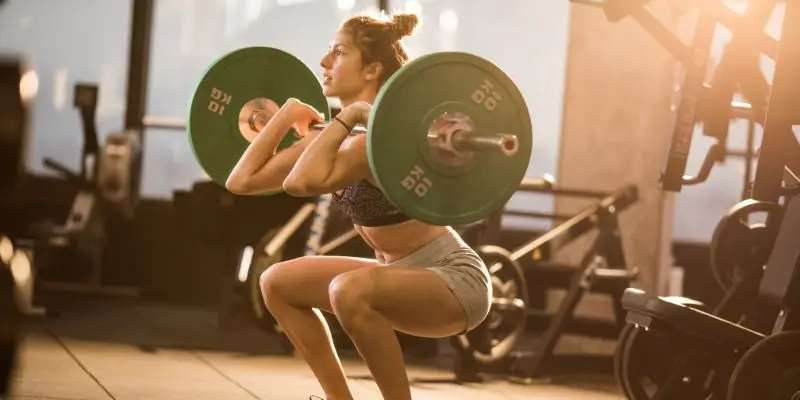Let's be honest, women have often felt awkward talking about their periods, and the sports world hasn't been the most open about it either. Some people even believe that working out during your period can do more harm than good, affecting your health and performance.
However, that's not the whole story! Keep reading to discover why strength and conditioning (S&C) training can be extremely beneficial for women and how trainers can customise strength and conditioning programmes to match individual needs.
S&C Training and The Menstrual Cycle
Getting into a structured S&C programme can be a game-changer for women who train. It can help improve their body composition, boost their mood, reduce the risk of injury by strengthening their bones and connective tissues, and even make their heart and lungs more efficient.
Our lives are full of rhythms, like our sleep patterns, digestion, and, of course, the menstrual cycle. Knowing more about these body cycles can help us achieve the health, fitness, and overall well-being we want.
When you consider that around 26% of the world's population is of reproductive age (according to UNICEF), it shows why it's so important for health and fitness pros to understand the menstrual cycle and support their clients effectively.
Understanding the Menstrual Cycle
For simplicity, let's stick to a 28-day cycle (though it can range from 21 to 35 days). This cycle has two parts: the follicular phase (days 1-14) and the luteal phase (days 15-28). We won't get too scientific here, but understanding what's happening inside a woman’s body can help you make your client’s workouts more effective.
By knowing the menstrual cycle better, you can be more aware of:
- How their body temperature changes during different phases
- When they might feel more tired during the cycle
- How their pain tolerance fluctuates
- How their overall exercise performance can vary
This knowledge will help fine-tune your training programme.
Several hormones play big roles during these phases, affecting not just fertility but also how women feel, perform, and handle exercise. These hormones include estrogen, progesterone, testosterone, and luteinizing hormone. To customise your strength and conditioning programme around their cycle, it's crucial to plan for each phase.

Follicular Phase (Days 1-14)
During this phase, go for high-intensity workouts and some heavy lifting. Think sprints, rowing, cycling, and barbell exercises like bench presses, squats, and deadlifts.
In these first 14 days, a woman’s body temperature stays steady, their pain tolerance goes up, and their ability to handle carbs gets better. In other words, it's the perfect time to hit the gym hard and break some personal records.
For example, a typical session might look like this:
- Warm-up: 5 minutes of incline walking followed by some dynamic stretches
- Barbell bench press: 3 sets of 8 reps (heavy)
- Barbell deadlift: 3 sets of 8 reps (heavy)
- Supersets: Dumbbell goblet squat and dumbbell straight leg deadlift - 3 sets of 8 reps (heavy)
- Assault bike: 4 sets of 20 calories with 2-minute rests between
- Cool down and stretches
Luteal Phase (Days 15-28)
In this phase, ease off the gas pedal a bit and go for lower-intensity workouts. A woman’s body temperature starts to rise, which can lead to earlier fatigue. Their pain tolerance drops, and they aren’t as good at handling carbs. It doesn’t have to mean a two-week break; adjust your programme to fit their body's needs.
Now's the time for activities like walking, swimming, and light jogging—make the most of their endurance abilities. If they are into tracking steps, aim for 10,000 a day!
For example, a session during the luteal phase might include:
- Warm-up: 5 minutes of incline walking followed by some dynamic stretches
- 15 minutes of easy cycling on an upright bike
- Supersets: Lat pull-down/shoulder press - 2 sets of 12 reps
- Supersets: Chest press/seated row - 2 sets of 12 reps
- Leg press: 3 sets of 12 reps
- Cool down: 10 minutes of steady rowing and a good stretch

Listen to Your Client’s Needs
You don't need to be a hormone expert, but it's good to know which exercises to do and how intense they should be during the follicular and luteal phases of your client’s cycle. During the follicular phase, go hard and have them work at high intensity, while the luteal phase is more about aerobic/endurance training.
Always listen to your client’s body's cues. Designing your workouts around their menstrual cycle can help them achieve results they might never have thought possible. As a personal trainer, this personalised approach sets you apart and shows you truly care about your clients.
Find out more about how you can become a personal trainer who specialises in women’s health and fitness on our website.



















